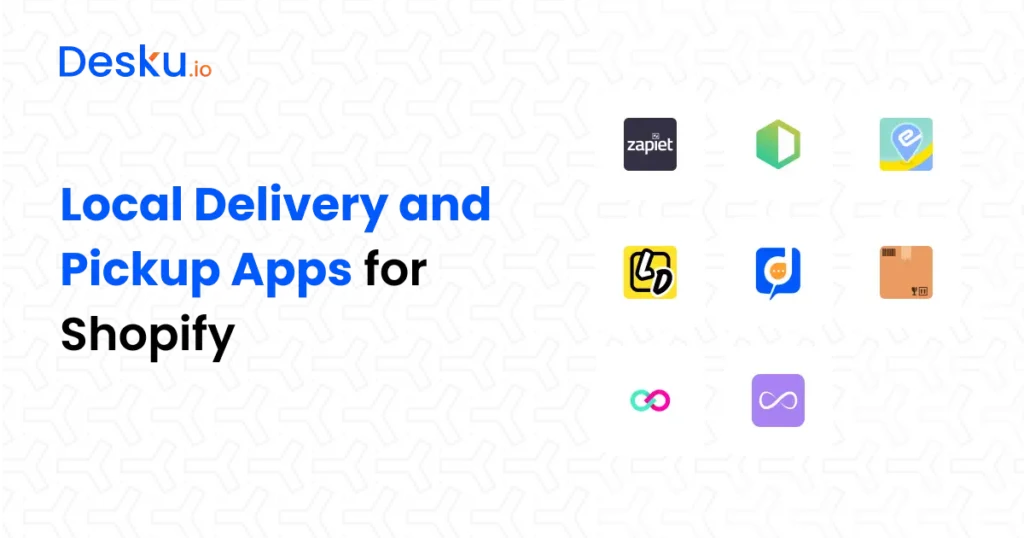Local delivery is more important than ever for Shopify store owners, agencies, and D2C brands. Customers want fast, reliable delivery, especially for nearby orders. But with so many apps out there, which ones are the best?
If you’re wondering what the best Shopify local delivery apps are, this article has you covered. We’ll dive into the top 7 apps that can streamline your delivery process, save you money, and keep your customers happy. Whether you’re running a small store or managing multiple clients, the right app can make all the difference.
By the end of this article, you’ll know exactly which app suits your business needs, and how to choose the right one. Ready to find out more? Let’s get started!
Shopify Payments is available in 23 countries, offering seamless payment solutions. (source)
Why Local Delivery is Important for Shopify Stores
Local delivery has become a game-changer for ecommerce businesses. Customers expect quick and reliable delivery, especially when they know the product is coming from a nearby location. Here’s why focusing on local delivery can make a significant difference for your Shopify store:
- Faster Delivery Times: Customers are more likely to purchase when they know they’ll receive their order quickly. Local delivery allows you to meet these expectations, often delivering within the same day or the next.
- Lower Shipping Costs: Shipping can be a major expense for ecommerce stores. Local delivery apps can help you reduce these costs by optimizing delivery routes and leveraging local couriers, which can be more affordable than national carriers.
- Improved Customer Satisfaction: Quick and reliable delivery leads to happier customers, and happy customers are more likely to become repeat buyers. They’re also more likely to leave positive reviews and recommend your store to others.
- Competitive Advantage: For D2C brands, offering local delivery can set you apart from competitors. It’s an added convenience that can turn window shoppers into loyal customers.
- Environmental Impact: Local delivery often has a smaller carbon footprint compared to shipping products long distances. Many customers value sustainability, so offering eco-friendly delivery options can enhance your brand’s image.
For Shopify agencies, recommending the right local delivery app to clients can enhance the value you provide. It’s a small change that can have a big impact on their bottom line, making it a key strategy for any ecommerce business.
The 07 Best Shopify Local Delivery Apps
1. Zapiet
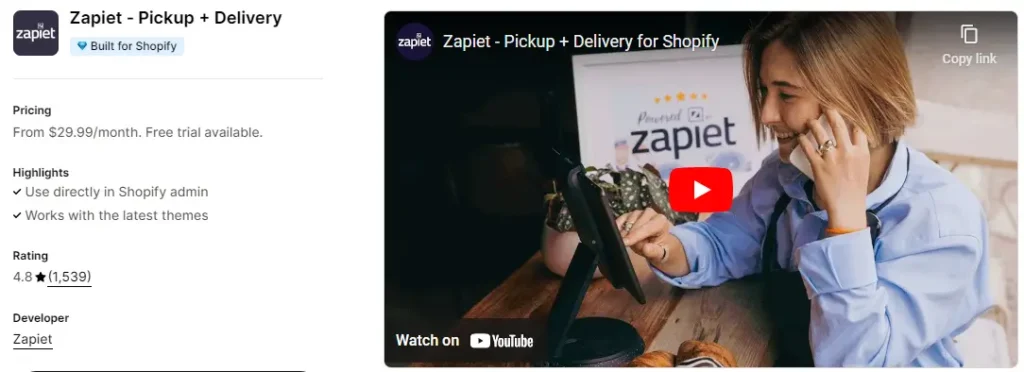
- Overview: Zapiet is a powerful Shopify app designed to handle local deliveries, in-store pickups, and even date and time selections. It’s a top choice for businesses with complex local delivery needs.
- Key Features:
- Fully customizable date and time picker for delivery.
- Advanced inventory management, syncing with multiple locations.
- Ability to set delivery rates based on distance, order value, or weight.
- Store locator integration.
- Blackout dates and lead times for delivery planning.
- Pros:
- Highly customizable.
- Excellent for managing both local delivery and in-store pickup.
- Reliable support and extensive documentation.
- Cons:
- The setup can be complex, especially for beginners.
- Premium pricing, which may not be suitable for small businesses.
- Pricing:
- Starts at $29.99/month for the Pickup + Delivery plan.
- Higher plans available with additional features.
- Ratings: ⭐⭐⭐⭐ (4.5/5)
- Best for: Stores with complex delivery needs or those offering both local delivery and in-store pickup.
2. Shipday

- Overview: Shipday is an intuitive delivery management app that focuses on real-time tracking and communication between store owners, drivers, and customers.
- Key Features:
- Real-time driver tracking with live updates.
- Automated SMS notifications for customers.
- Route optimization to minimize delivery time and costs.
- Proof of delivery with photos and signatures.
- Easy-to-use driver app.
- Pros:
- Affordable pricing, even for small businesses.
- Strong focus on customer communication.
- Simple and straightforward to use.
- Cons:
- Limited customization options for branding.
- Not as feature-rich as some other apps on this list.
- Pricing:
- Free plan available with basic features.
- Paid plans start at $10/month, depending on delivery volume.
- Ratings: ⭐⭐⭐⭐ (4.7/5 )
- Best for: Small to medium-sized stores needing efficient delivery tracking.
3. EasyRoutes
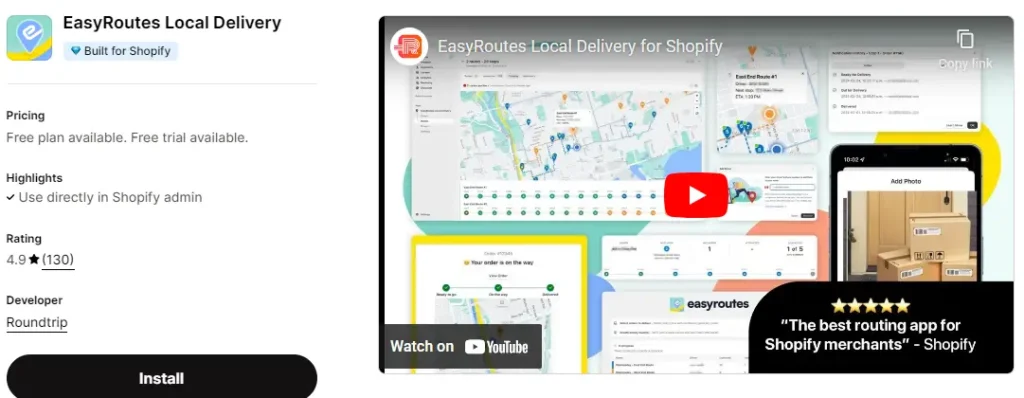
- Overview: EasyRoutes by Roundtrip is designed for small to medium-sized businesses looking for a simple yet powerful local delivery solution. It offers route optimization, real-time tracking, and proof of delivery.
- Key Features:
- Easy route planning and optimization for multiple stops.
- Driver management with tracking and proof of delivery.
- Integration with Shopify orders and customer data.
- Customizable delivery notes for special instructions.
- Email notifications for customers with tracking links.
- Pros:
- Extremely user-friendly with a quick setup process.
- Excellent customer support and documentation.
- Affordable pricing plans with a focus on small businesses.
- Cons:
- Limited advanced features for larger operations.
- Not ideal for businesses needing multi-location management.
- Pricing:
- Starts at $19/month for the Essential plan.
- Pro plan available at $49/month with additional features.
- Ratings: ⭐⭐⭐⭐ (4.8/5 )
- Best for: Stores that prioritize ease of use and simple setup.
4. Local Delivery
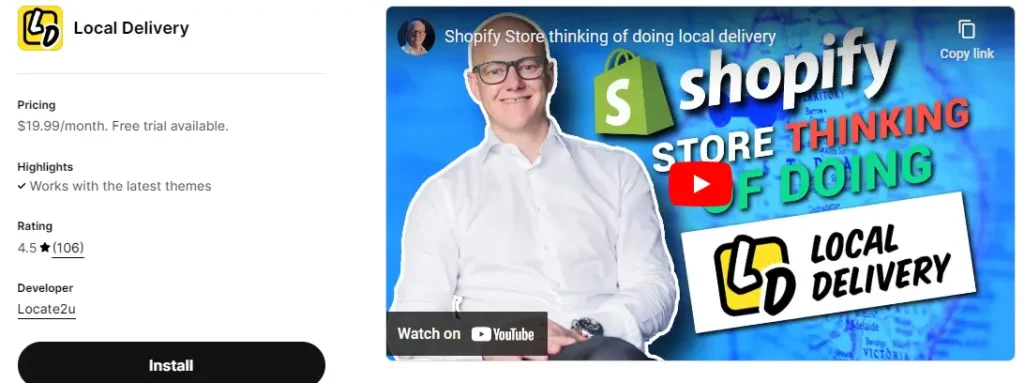
- Overview: Local Delivery by Shopify is a basic but effective solution for managing local deliveries. It’s perfect for smaller stores looking to get started with local delivery without the need for complex features.
- Key Features:
- Easy setup directly within Shopify’s admin panel.
- Delivery zones and flexible pricing based on distance.
- Integration with Shopify’s existing order management system.
- Automatic order updates for customers.
- Simplified delivery process with essential features.
- Pros:
- Budget-friendly with no additional app costs.
- Seamless integration with Shopify.
- Perfect for stores just starting out with local delivery.
- Cons:
- Very limited in features compared to other apps.
- Not suitable for stores with high delivery volumes or complex needs.
- Pricing:
- Free (Included with Shopify subscription).
- Ratings: ⭐⭐⭐⭐ (4.2/5)
- Best for: New or smaller stores just starting with local delivery.
5. Bringg
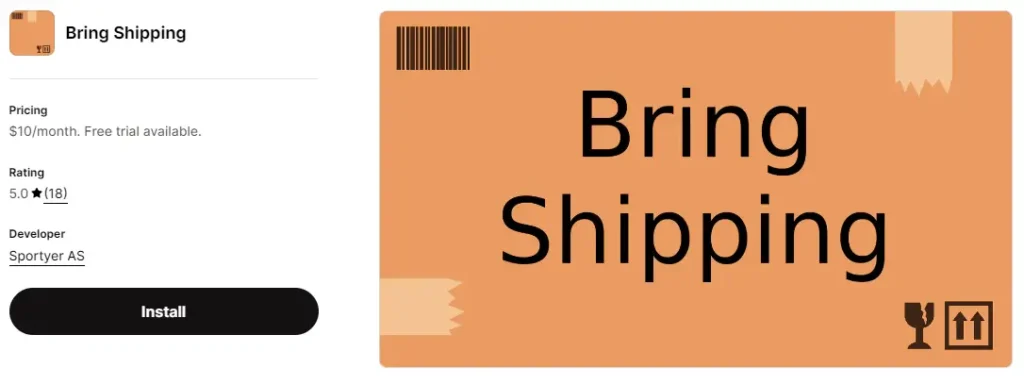
- Overview: Bringg is an enterprise-level logistics platform that offers comprehensive delivery management solutions. It’s designed for businesses with complex delivery and logistics needs.
- Key Features:
- Real-time delivery visibility and analytics.
- Integration with multiple delivery services and carriers.
- Advanced route optimization and fleet management.
- Customer communication and feedback tools.
- Scalable solutions for businesses of all sizes.
- Pros:
- Extremely powerful with a wide range of features.
- Scalable to meet the needs of growing businesses.
- Excellent analytics and reporting tools.
- Cons:
- Higher cost, which may not be justifiable for small stores.
- Complex setup and learning curve.
- Pricing:
- Custom pricing based on business needs; typically starts at $500/month.
- Ratings: ⭐⭐⭐⭐ (4.3/5)
- Best for: Enterprise-level businesses or stores with complex delivery needs.
6. ShippyPro
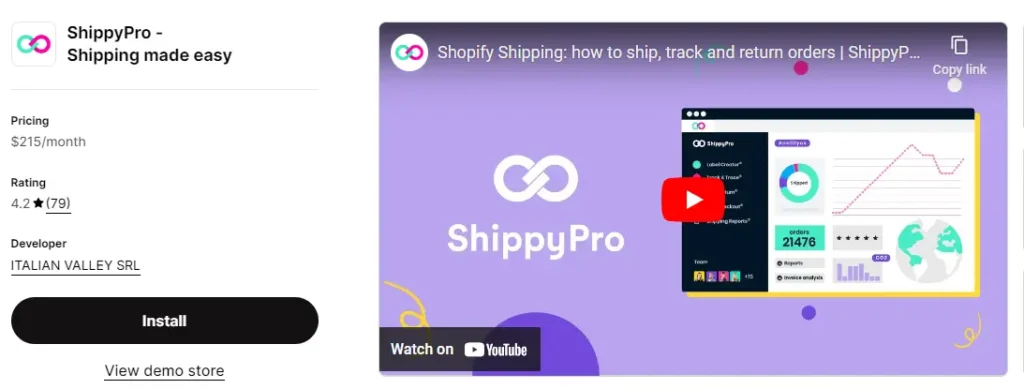
- Overview: ShippyPro is a versatile shipping and delivery management platform that supports multi-carrier integration, making it ideal for businesses handling both local and international deliveries.
- Key Features:
- Integration with over 60 carriers worldwide.
- Customizable tracking pages with branded options.
- Advanced return management and tracking.
- Automated shipping label generation.
- Delivery status notifications for customers.
- Pros:
- Great for businesses managing multiple carriers and international shipments.
- Extensive customization options for branding.
- Strong return management features.
- Cons:
- May have more features than needed for local-only deliveries.
- Learning curve due to the wide range of features.
- Pricing:
- Starts at €29/month for the Essential plan.
- Higher plans available for more features and volume.
- Ratings: ⭐⭐⭐⭐ (4.5/5)
- Best for: Stores that handle both local and international shipments.
7. Onfleet
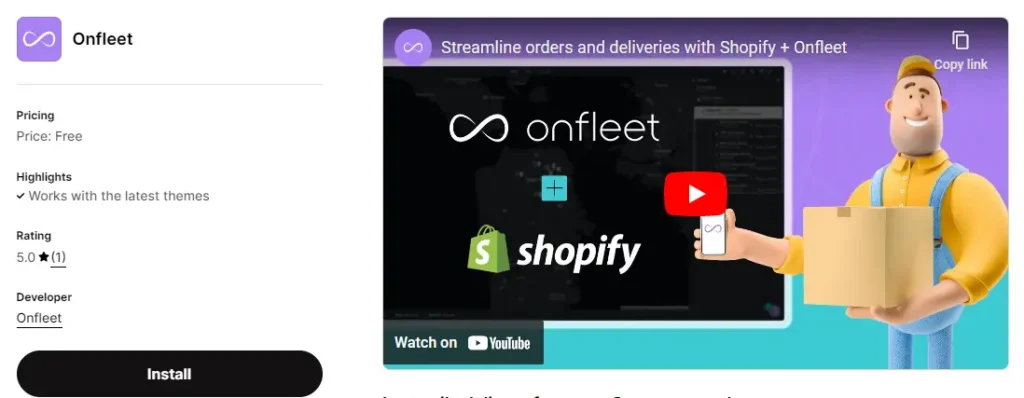
- Overview: Onfleet is a premium delivery management platform that offers advanced features for businesses requiring detailed driver management, route optimization, and customer communication tools.
- Key Features:
- Real-time driver tracking and fleet management.
- Advanced route optimization with multi-stop deliveries.
- Automated customer notifications via SMS and email.
- Proof of delivery with photos, signatures, and notes.
- Comprehensive analytics and reporting.
- Pros:
- Rich in features, ideal for businesses with high delivery volumes.
- Excellent customer communication tools.
- Strong focus on driver management and route efficiency.
- Cons:
- Premium pricing, which may not suit smaller businesses.
- Can be complex to set up and fully utilize.
- Pricing:
- Starts at $149/month for the Starter plan.
- Higher tiers available with additional features.
- Ratings: ⭐⭐⭐⭐ (4.6/5)
- Best for: Established businesses that require advanced delivery features.
How to Choose the Right App for Your Store
With nine excellent options on the table, selecting the best Shopify local delivery app can feel overwhelming. Here’s how to narrow down your choices and pick the one that’s right for your business:
Assess Your Delivery Needs
- Begin by reviewing your current delivery process. How many local deliveries do you handle daily? Do you need route optimization, real-time tracking, or multi-stop delivery management? Identify your must-have features to start filtering your options.
Consider Your Budget
- The cost of the app is a critical factor, especially for smaller businesses. While some apps offer affordable plans or even free basic versions, others are priced for more extensive operations. Align the app’s cost with your budget while considering how much value the features will add to your delivery process.
Test Multiple Apps
- Many apps offer free trials or demo versions. Take advantage of these to test how well the app integrates with your existing systems, how easy it is to use, and how it performs under real-world conditions. Testing will give you hands-on experience and help you make a more informed decision.
Check Reviews and Case Studies
- User reviews and ratings are invaluable. Look for feedback from other Shopify store owners with similar business models. Case studies can also offer insights into how the app has improved the delivery process for other businesses, highlighting practical benefits and potential drawbacks.
Plan for Future Growth
- Your business will likely grow, and your delivery needs may become more complex. Choose an app that can scale with you. Whether it’s handling more deliveries, expanding into new regions, or integrating with other tools, your chosen app should be able to support your evolving needs.
Evaluate Integration with Other Tools
- If you’re using other apps or tools for order management, customer communication, or analytics, ensure that your local delivery app integrates well with them. A seamless integration will streamline operations, reduce manual work, and prevent data silos.
Look at Customer Support
- Reliable customer support is crucial, particularly during the setup phase or if issues arise during busy periods. Choose an app with a good reputation for customer service, offering resources like live chat, comprehensive documentation, or even personalized onboarding.
Focus on User Experience
- Both your team and your customers should find the app easy to interact with. A user-friendly interface reduces training time and operational errors, while a smooth customer experience (like easy tracking and timely notifications) can boost satisfaction and repeat business.
Case Studies or Testimonials
Sometimes, the best way to understand the value of a local delivery app is to see it in action. Here are some real-world examples of how these apps have helped businesses like yours:
D2C Skincare Brand Boosts Customer Satisfaction with Zapiet
- The Problem: A skincare brand that sells directly to consumers struggled with manual scheduling and poor communication during the delivery process, leading to delayed orders and unhappy customers.
- The Solution: They implemented Zapiet, allowing customers to select delivery times and receive automated notifications.
- The Result: Customer satisfaction scores increased by 20%, with a significant reduction in missed deliveries and late orders.
Local Bakery Streamlines Deliveries with EasyRoutes
- The Problem: A popular local bakery was overwhelmed by delivery orders during peak hours, resulting in delayed deliveries and customer complaints.
- The Solution: EasyRoutes provided the bakery with route optimization and an easy-to-use interface for managing multiple delivery routes simultaneously.
- The Result: Delivery times were cut by 30%, fuel costs dropped, and customer satisfaction increased due to more timely deliveries.
Fashion Boutique Cuts Delivery Costs with Shipday
- The Problem: A boutique fashion store was spending too much on delivery fees with national courier services, which was eating into their profits.
- The Solution: Switching to Shipday allowed them to leverage local delivery options and optimize routes, significantly reducing costs.
- The Result: The boutique reduced delivery costs by 40%, allowing them to reinvest the savings into customer acquisition and marketing.
Grocery Store Handles High Volume with Onfleet
- The Problem: A growing grocery delivery service faced challenges managing a large number of daily deliveries, leading to inefficiencies and customer dissatisfaction.
- The Solution: Onfleet provided advanced route optimization and real-time driver management, helping them handle high delivery volumes effectively.
- The Result: The grocery store improved delivery times, decreased operational costs, and saw a 15% increase in repeat customers.
Key Features to Look for in a Local Delivery App
Choosing the right local delivery app for your Shopify store isn’t just about picking the first one you see. It’s crucial to consider specific features that will meet your business needs. Here are some key features you should look for:
User-Friendly Interface
An intuitive interface is essential. The app should be easy to set up and manage without needing a technical background. If you or your team struggle to use it, it’s not the right fit.
Real-Time Tracking
Customers want to know where their order is at all times. Look for apps that offer real-time tracking, so your customers can monitor their delivery from dispatch to doorstep. This feature not only improves customer satisfaction but also reduces “Where’s my order?” inquiries.
Integration with Shopify
Seamless integration with Shopify is non-negotiable. The app should easily sync with your store’s inventory, order management system, and checkout process. This will ensure a smooth operation without needing multiple manual updates.
Flexible Pricing Options
Pricing flexibility is important, especially if you’re a smaller store or just starting. Look for apps that offer tiered pricing or pay-as-you-go models. This allows you to scale the service as your business grows.
Customer Support
Reliable customer support is vital, especially if you run into issues during a busy sales period. Choose an app with a strong support team that offers quick response times, comprehensive documentation, and live chat options.
Customization and Branding
If maintaining your brand’s identity is important, find an app that allows you to customize delivery notifications, tracking pages, and other customer-facing elements. This small detail can help reinforce your brand image throughout the customer journey.
Advanced Routing and Delivery Options
For stores handling high delivery volumes, advanced routing options are a must. The app should optimize delivery routes to save time and fuel, and offer features like multi-stop deliveries or scheduled deliveries.
Scalability
As your business grows, your delivery needs will evolve. Make sure the app you choose can scale with you, whether that means handling more deliveries, expanding into new regions, or integrating with other tools you use.
Reviews and Ratings
Before finalizing your choice, check out user reviews and ratings. Real feedback from other Shopify store owners can provide insights into the app’s performance, reliability, and customer service.
FAQs
What is the best app for small Shopify stores?
EasyRoutes or Local Delivery are great options for small stores due to their ease of use and affordable pricing.
Can these apps handle high delivery volumes?
Yes, apps like Bringg and Onfleet are designed to manage high delivery volumes and complex logistics.
Do these apps offer delivery tracking for customers?
Most of the apps mentioned, like Shipday and Circuit, offer real-time delivery tracking and customer notifications.
How do I integrate a delivery app with my Shopify store?
Integration is usually straightforward. Most apps connect directly to your Shopify store through the Shopify App Store. Simply install the app, follow the setup instructions, and it will sync with your store’s orders and inventory.
Are there any free local delivery apps for Shopify?
Some apps offer free plans with basic features, such as Local Delivery. However, you may need to upgrade to a paid plan to access more advanced features.
Conclusion
Choosing the right local delivery app for your Shopify store is crucial to improving your delivery process, cutting costs, and enhancing customer satisfaction. Whether you’re a small business just starting or an established D2C brand, there’s an app that fits your needs.
Start by assessing what features are most important to you, then test a few of the apps mentioned. With the right tools in place, you’ll be able to offer faster, more reliable delivery options that keep your customers coming back.
